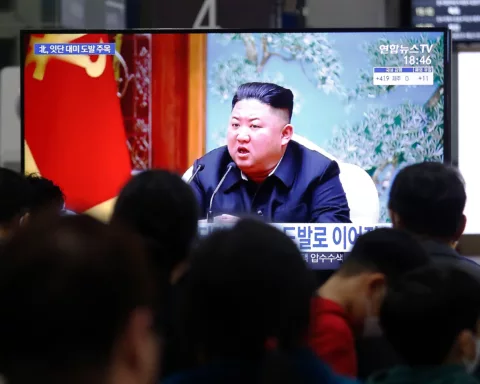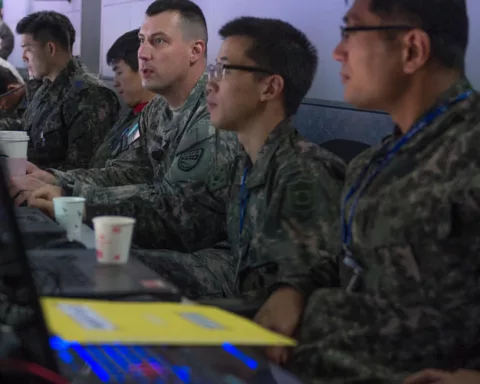Audrey Strauss, the United States Attorney for the Southern District of New York, announced today that VIRGIL GRIFFITH, a U.S. citizen, pled guilty to conspiring to violate the International Emergency Economic Powers Act (“IEEPA”) by providing services to the Democratic People’s Republic of Korea (“DPRK” or “North Korea”) including technical advice on using cryptocurrency and blockchain technology to evade sanctions. GRIFFITH pled guilty today before U.S. District Judge P. Kevin Castel.
U.S. Attorney Audrey Strauss stated: “As he admitted in court today, Virgil Griffith agreed to help one of our nation’s most dangerous foreign adversaries, North Korea. Griffith worked with others to provide cryptocurrency services to North Korea and assist North Korea in evading sanctions, and traveled to North Korea to do so. In the process, Griffith jeopardized the national security of the United States by undermining the sanctions that both Congress and the President have enacted to place maximum pressure on the threat posed by North Korea’s treacherous regime.”
According to the Indictment and other documents in the public record, as well as statements made in public court proceedings:
Pursuant to the IEEPA and Executive Order 13466, United States Persons are prohibited from exporting any goods, services, or technology to the DPRK without a license from the Department of the Treasury, Office of Foreign Assets Control (“OFAC”).
GRIFFITH, a cryptocurrency expert, began formulating plans as early as 2018 to provide services to individuals in the DPRK by developing and funding cryptocurrency infrastructure there, including to mine cryptocurrency. GRIFFITH knew that the DPRK could use these services to evade and avoid U.S. sanctions, and to fund its nuclear weapons program and other illicit activities.
In April 2019, GRIFFITH traveled to the DPRK to attend and present at the “Pyongyang Blockchain and Cryptocurrency Conference” (the “DPRK Cryptocurrency Conference”). Despite the fact that the U.S. Department of State had denied GRIFFITH permission to travel to the DPRK, GRIFFITH delivered presentations at the DPRK Cryptocurrency Conference, tailored to the DPRK audience, knowing that doing so violated sanctions against the DPRK.
At the DPRK Cryptocurrency Conference, GRIFFITH and his co-conspirators provided instruction on how the DPRK could use blockchain and cryptocurrency technology to launder money and evade sanctions. GRIFFITH’s presentations at the DPRK Cryptocurrency Conference had been approved by DPRK officials and focused on, among other things, how blockchain technology such as “smart contracts” could be used to benefit the DPRK, including in nuclear weapons negotiations with the United States. GRIFFITH and his co-conspirators also answered specific questions about blockchain and cryptocurrency technologies for the DPRK audience, including individuals whom GRIFFITH understood worked for the North Korean government.
After the DPRK Cryptocurrency Conference, GRIFFITH pursued plans to facilitate the exchange of cryptocurrency between the DPRK and South Korea, despite knowing that assisting with such an exchange would violate sanctions against the DPRK. GRIFFITH also attempted to recruit other U.S. citizens to travel to North Korea and provide similar services to DPRK persons, and attempted to broker introductions for the DPRK to other cryptocurrency and blockchain service providers. At no time did GRIFFITH obtain permission from OFAC to provide goods, services, or technology to the DPRK.
* * *
VIRGIL GRIFFITH, 38, a resident of Singapore and citizen of the United States, pled guilty to one count of conspiring to violate IEEPA, which carries a maximum term of 20 years in prison. GRIFFITH is scheduled to be sentenced by Judge Castel on January 18, 2022, at 11:00 a.m.
The maximum potential sentence is prescribed by Congress and is provided here for informational purposes only, as any sentencing of the defendant would be determined by the judge.
Ms. Strauss praised the outstanding investigative work of the Federal Bureau of Investigation and its New York Field Office, Counterintelligence Division, and thanked the U.S. Department of State’s Diplomatic Security Service, the Department of Justice’s National Security Division, Counterintelligence and Export Control Section, the Department of Justice’s Office of International Affairs, and the Singapore Police Force for their assistance.
The case is being handled by the Office’s Terrorism and International Narcotics Unit. Assistant U.S. Attorneys Kimberly Ravener and Kyle A. Wirshba are in charge of the case, with assistance from Deputy Chief Elizabeth Cannon and Trial Attorney Matthew J. McKenzie of the Counterintelligence and Export Control Section.






